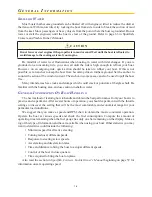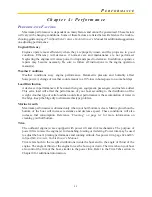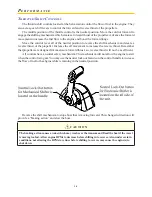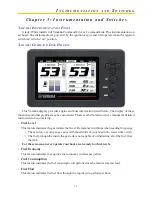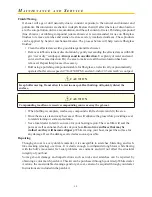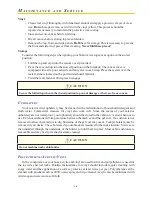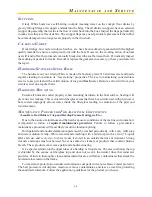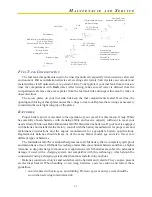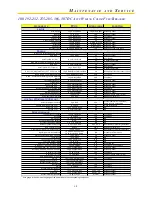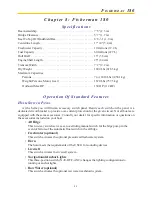
6-2
m
a I n T e n a n C e
a n d
s
e r v I C e
Finish/Waxing
Gel-coat will age or dull naturally due to constant exposure to the natural environment and
pollutants. Discolorations are shallow in depth. Factors that will affect the rate of discoloration
are: the sun, pollution, old wax accumulation, and the salt content of water. Polishing compound
(fine abrasive) or rubbing compound (coarse abrasive) is recommended for use on fiberglass
finishes to remove scratches and stains or restore severely weathered surfaces. These products
can be applied by hand or mechanical means. The process below will help restore fiberglass
finishes:
• Clean the affected area with a good detergent and fresh water.
•
Remove stubborn stains or discoloration by gently wet sanding the affected areas with 600
grit “wet or dry” sandpaper.
Always sand in one direction.
Use plenty of water and sand
curves in the same direction. Dry the area to make sure all the discoloration has been
removed. Repeat this process if necessary.
•
Buff using a polishing compound suitable for fiberglass, an electrically or pneumatically
operated buffer at low speed (1750-2250 RPM), and an 8-inch (20.3cm) lamb’s wool pad.
C A U T I O N
Keep buffer moving. Do not allow it to rest in one spot. Heat build up will quickly distort the
surface.
C A U T I O N
Compounding too often or excessive compounding can wear away the gel-coat.
•
When buffing is complete, wash away compound with fresh water and dry the area.
•
Once the area is clean it may be waxed. This will enhance the gloss while providing a seal
to retard staining or soil accumulation.
•
See a local dealer for advice on wax for your boating region. The wax film will seal the
pores as well as enhance the looks of your boat.
Do not wax surfaces that may be
walked on; they will become slippery.
While waxing your boat, inspect the surface for
any damage. Have the damage corrected as soon as possible.
Repairing
Though gel-coat is a very durable material, it is susceptible to scratches, blistering, and web-
like cracking (crazing) over time. It is elastic enough to withstand strong blows while flexing
with the hull’s movement. Gel-coat problems are cosmetic and will not affect the structural
integrity of your boat.
Some gel-coat damage and imperfections such as nicks and scratches can be repaired by
obtaining a color match patch kit. This kit can be purchased through your Grady-White dealer.
Acetone, the most suitable cleaning agent for gel-coat, can also be acquired through your dealer.
Instructions are included in the patch kit.
Summary of Contents for 181 CE 2017
Page 1: ......
Page 3: ......
Page 7: ...T a b l e o f C o n t e n t s ...
Page 11: ...1 4 W e l c o m e ...
Page 25: ...3 6 G e n e r a l I n f o r m a ti o n ...
Page 33: ...5 4 I n s t r u m e n t a ti o n a n d S w itc h e s ...
Page 43: ...6 10 M a i n t e n a n c e a n d S e r v ic e ...
Page 54: ...8 7 Fisherman 180 Safety Labels and Location ...
Page 55: ...8 8 Fisherman 180 ...



